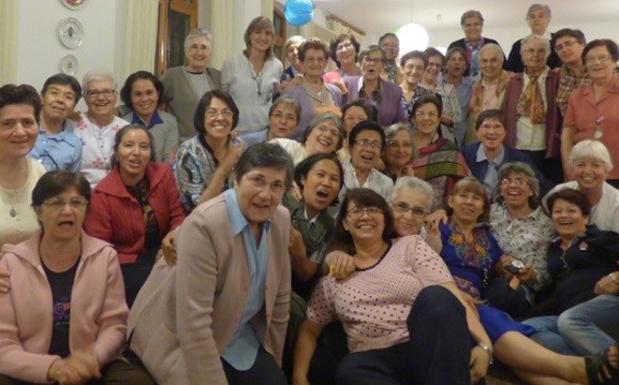The Oblate Sisters of Almeria receive the Medal of Andalusia
for Solidarity and Concord
The Congregation of the Oblate Sisters of the Most Holy Redeemer of Almeria received the Andalusia Medal of Solidarity and Concord from the Andalusian Regional Government. The ceremony was held a ceremony held On Sunday, February 28, 2021, at the Teatro de la Maestranza in Seville. María Teresa Foronda, the Oblate Sisters project director, received the award from the President of the Andalusian Parliament, Marta Bosquet, from Almeria.
“We were talking about social commitment, and there are people who carry this desire to help to the point of giving their lives. Often those who give the most are the least talked about, the most humble people. Like the Congregation of the Oblate Sisters of Almeria, dedicated to helping women who are victims of sexual exploitation,” said the presenter, Eva González.

In a video recorded beforehand and shown when the award was announced, Foronda acknowledged that receiving the medal was a joy and coincided with the 50th anniversary of the Oblate Sisters’ stay in Almeria. The project director dedicated the award to all the women they work with daily and struggle to get ahead despite the difficulties. “They are an example of strength and resilience in the face of the many adversities they have to overcome every day,” she said, before thanking the work of “all the Oblate Sisters who have dedicated their lives over the past five years to help the women who need it most. “For their dedication, generosity and service,” he concluded.
The Congregation of the Oblate Sisters of the Most Holy Redeemer offers accompaniment, help and resources to women who find themselves in contexts of prostitution or who are victims of trafficking for social exploitation. They work with them to defend their rights and to seek opportunities for promotion and inclusion.
In Almeria, the Oblates project is materialised in the existence of shelter and support flats for these women in a situation of social exclusion. They are offered these spaces of personal security that provide them with the necessary opportunities to overcome the vulnerability they stay in and achieve autonomy, social stability and employment.
Along with the Oblate project, Almeria is also developing the Encuentro project, which results from a collaboration between the Oblates and the Adorers to help women involved in prostitution by going to places such as clubs highways, farmhouses and brothels. They offer information and counselling, health mediation, orientation and job placement, and training from a gender perspective in these areas. They also have flats and shelters run by both congregations.

The initiatives developed by the Oblates consist of personalised and comprehensive care, the development of training activities, awareness-raising and social transformation, volunteering, teamwork and inter-congregational work.
All Oblate projects and social centres become places of welcome and integral support for women. Individualised accompaniment fosters autonomy and integration processes, which include psychosocial care, residential care, training, entrepreneurship and job placement, and other individual or group actions depending on each situation.
In 1870, Antonia de Oviedo y Schönthal founded the Oblate Sisters of the Most Holy Redeemer in Ciempozuelos, province of Madrid, and adopted the name ‘Mother Antonia of Mercy’. Consecrated to the redemption mission, they offered a home to women who were prostitutes in Madrid at the time.
(Daniel Serrano, ideal.es)






